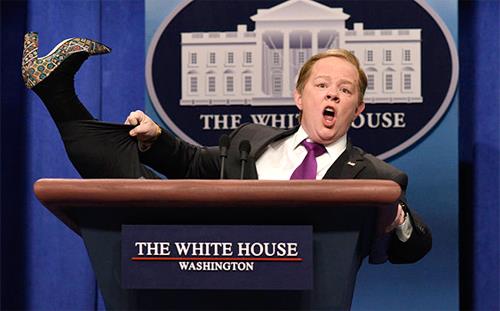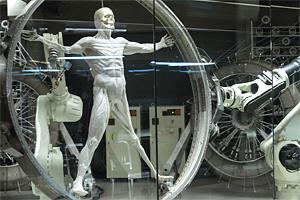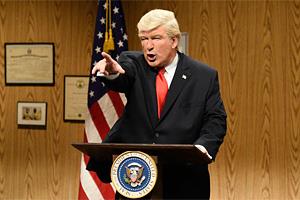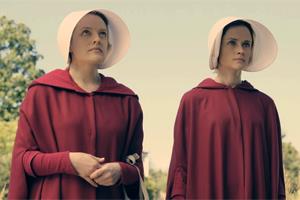
To paraphrase Mark Twain, updated for modern times and the era of Modern Family, reports of Saturday Night Live’s death have been greatly exaggerated. Perhaps it was to be expected during these political times, in the age of He Who Must Not Be Named, but Lorne Michaels’ seemingly ageless sketch comedy program that always wore politics on his sleeve, ran the table with a field-leading 22 mentions when nominations for the 2017 Emmy Awards were announced Thursday.
 Not to be outdone perhaps, Jonathan Nolan and Lisa Joy’s dyspeptic future western Westworld (right) also landed 22 nominations, justifying those — TV Worth Watching among them — who suggested there was more going on there than a big-money HBO remake of a cheesy 1973 feature film.
Not to be outdone perhaps, Jonathan Nolan and Lisa Joy’s dyspeptic future western Westworld (right) also landed 22 nominations, justifying those — TV Worth Watching among them — who suggested there was more going on there than a big-money HBO remake of a cheesy 1973 feature film.
If nothing else, the Emmy attention lavished on Westworld proves Emmy voters’ memories not only reach back as far as last December — the last time a new episode of Westworld aired — but that good ideas never grow old. Sci-fi novelist Michael Crichton’s conceived a future world where people’s idea of the ultimate fantasy vacation can become true, for the right price, and in so doing raised complex questions about what it means to be alive, and where fantasy, morality and ethics intersect. If nothing else, the TV version of Westworld showed the power of the small screen and how cable TV can tells stories movies can’t. Viewed in that context, it’s perhaps no surprise Westworld resonated with Emmy voters the way it did.
 In its own way, Saturday Night Live also proved its resilience, and its relevance in the time of He Who Must Not Be Named. (Alec Baldwin, right.) I’ll be the first to grumble that a weak episode of SNL can be a chore to sit through — it’s coming up on one in the morning, for fright’s sake — but SNL has always been hit and miss. And when it hits, it’s like witnessing history by lightning.
In its own way, Saturday Night Live also proved its resilience, and its relevance in the time of He Who Must Not Be Named. (Alec Baldwin, right.) I’ll be the first to grumble that a weak episode of SNL can be a chore to sit through — it’s coming up on one in the morning, for fright’s sake — but SNL has always been hit and miss. And when it hits, it’s like witnessing history by lightning.
Unsurprisingly, SNL’s 22 Emmy nods are heavily weighted toward acting and include no fewer than three mentions for supporting actress in a comedy (Vanessa Bayer, Leslie Jones and, surprise!, Kate McKinnon), a mention for supporting actor (Alec Baldwin), three shots are guest actor (Dave Chappelle, Tom Hanks and Lin-Manuel Miranda) and two shots at guest actress (Kristen Wiig and, surprise!, Melissa McCarthy, top).
By the numbers.
This was a very good year for TV, and a good year for cable and the streaming services. It’s possibly a little facile to call Netflix the new HBO — FX may have something to say about that, not to mention Hulu — bit it’s worth noting those programs that hit double figures in Emmy nominations, and have to accept the fact that the era of mainstream, far-reaching past Emmy contenders like ER, Hill Street Blues and The West Wing are just that — in the past.
NBC’s fine freshman drama This Is Us broke into double figures, with 11 nominations — and deservedly so — but it was the only network program, aside from SNL, to break into the top 14 with double figures.
Netflix’s Stranger Things — (right) insert a coo of delight here on my part; I really did fear it might be overlooked — scored 18 nominations, alongside FX’s Feud: Bette and Joan. Comedy perennial Veep landed 17; HBO’s Big Little Lies and FX’s Fargo scored 16. Hulu’s The Handmaid’s Tale, HBO’s The Night Of and Netflix’s The Crown scored 13 apiece.
Other programs scoring double figures included BBC America’s Planet Earth II, HBO’s Silicon Valley and National Geographic’s Genius.
Better Call Saul, which I had pegged to be a serious contender in the drama categories, landed nine nominations.
The Americans, on the other hand, which I also pegged to be a serious contender, earned just four mentions: for lead actor (Matthew Rhys), lead actress (Keri Russell), writing and guest actress (Alison Wright).
That’s respectable, but in the larger picture The Americans’ losing out on a drama series nod, directing and other supporting acting nods, not to mention production design, art direction, costumes, sound editing, hairstyling — it’s set in the Ronald Reagan ‘80s after all — and its inspired use of period music seems a bit harsh.

If I were to pick a winner — the Emmys themselves will be handed out Sept. 17, on CBS — my money’s on The Handmaid’s Tale for outstanding drama series, but we’ll see. The great thing about so much quality drama being recognized in such a finite field is that virtually any of the drama nominees could win, and it would be hard to argue against them. Few predicted Westworld’s scoring such a numerical advantage over the field in the technical categories, let alone a best-series nod, but in hindsight that seems a failing on the part of the self-styled experts, not the show itself. Westworld had been largely overlooked in the big TV awards handed out so far this year, and so it was just easy to assume it would be forgotten this time around. Wrong!
Drama, drama.
As expected, the absence of Game of Thrones opened up the field for first-timers. Few could have expected, though, that of the seven nominees for outstanding drama series, no fewer than five — five! — are newcomers. The Crown, The Handmaid’s Tale, This Is Us, Westworld and Stranger Things all made the shortlist, together with Emmy perennials Better Call Saul and House of Cards.
The drama acting categories featured few surprises, despite stiff competition: Bob Odenkirk, Liev Schreiber, Matthew Rhys and Sterling K. Brown (This is Us, right) were all to be expected, though the other contenders, also expected, movie actors Anthony Hopkins and Kevin Spacey probably need another acting award like they need another hole in their head.
On the women’s side — the TV Academy is still a long way from treating actors equally, regardless of gender — Elisabeth Moss, Keri Russell, Viola Davis, Evan Rachel Wood, Robin Wright and first-time nominee Claire Foy were virtual shoo-ins, if not actual locks. For all the inevitable grumbling about omissions, that particular conversation is unlikely to include too many actors. For once.
Snubbed! How cruel.
Inevitably, even with a gazillion categories up for grabs — and with the roster of nominees expanded to seven in the sexy, high-profile categories like lead actor and outstanding comedy series — there are bound to be disappointments. If nothing else, grumbling about “the leftovers,” the cast aside, the helpless, hapless and hopelessly ignored is at least a conversation starter. If no one talked about the Emmys, who would bother to watch?
Social media is already railing against the omission of The Good Fight, Mr. Robot (right) — a multiple winner last year, after all — The Big Bang Theory, Insecure, Comedians in Cars Getting Coffee, Girls, American Gods, Empire, Transparent, The Tonight Show Starring Jimmy Fallon, The Leftovers and The Young Pope.
As always, these things are subjective. Personally, I couldn’t be happier The Young Pope was overlooked, if for no other reason than I found it to be unwatchable. As for Fallon’s omission, I would simply tell the doubters to watch Late Night with Seth Meyers, or SNL for that matter, and then ask themselves if they really need to ask that question.
I am a little surprised, though, to see Girls and The Leftovers overlooked for what were, by most if not all accounts, fine summoning-up final seasons. I was also surprised to see The Good Fight given so little credit for following up on The Good Wife — an Emmy favorite — with a spin-off that not only does credit to the original but stands on its own as a standalone drama in its own right.
And, saving the worst snub for last: Emmy voters’ overlooking Michael McKean in Better Call Saul seems an almost unforgiveable oversight, especially given how the show itself — and Bob Odenkirk — got Emmy nominations, proving, if nothing else, that voters at least watched the show. Rhea Seahorn’s absence is also an oversight, but McKean is one of those say-what omissions that leaves one feeling, well, speechless.
Where Emmy got its name.
Since you asked, here goes. In 1948, the Television Academy’s founding fathers struggled to come up with a name. Academy founder Syd Cassyd suggested “Ike,” for the (then) groundbreaking iconoscope tube. Pioneering engineer and future Academy president Harry Lubcke, clearly a believer in semantics, instead proposed “Immy,” for the image-orthicon camera tube. Lubcke won.
“Immy” was then feminized as “Emmy,” after the statuette’s designer Louis McManus, an engineer in his day job, insisted that his wife Dorothy pose for the statuette. McManus said he intended the design depict the winged “muse of art, uplifting electron of science.”
Yes, it sounds like an out-of-sweeps episode of The Big Bang Theory. But now you know.